With many exciting initiatives being launched this year, the Faculty of Law opens the door to a deeper understanding of disability rights.
By Bridget Wayland
People with disabilities are one of the most marginalized groups in the world, facing higher rates of unemployment and poverty as well as other barriers to full social, economic, cultural, and political citizenship. Statistics Canada reports that more than 14 percent of the population, or 4.4 million Canadians, live with a disability—and that this figure is increasing.
Not surprisingly, “there has been a growing global interest in human rights issues facing persons with disabilities,” observes Professor Colleen Sheppard, Director of the Centre for Human Rights and Legal Pluralism (CHLRP). McGill’s Faculty of Law has been deepening its commitment to this important field with a new seminar series, graduate student engagement, and several more initiatives being launched this year.
Graduate Student Engagement
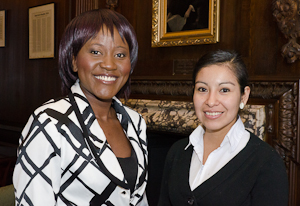
This fall, the CHRLP welcomed its two first Disability Rights Fellows, LL.M. students Dianah Msipa and Eliana Rosas Aguilar, who received Disability Rights Scholarships from the Open Society Institute (OSI) as well as funding from the Rathlyn Foundation and Justice James K Hugessen Fellowships at the Faculty.
“I am interested in disability rights from an access to justice perspective,” says Msipa. “I work as prosecutor in Zimbabwe and I have handled some cases involving rape victims with intellectual or mental disabilities. The unfortunate thing I see happening is that, though the victims come forward, they are often deemed as incompetent witnesses in court. So the case falls apart. The suspect is released and the victim goes back into a society that does not protect her. This really touched me, and it is what inspired me to apply to the disability rights initiative.”
Our second Disability Rights Fellow, Rosas Aguilar, is writing her LL.M. thesis on reasonable accommodations for persons with disabilities. She is an adjunct instructor and academic assistant at the Pontificia Universidad Católica del Perú who, while interning at the Instituto de Defensa Legal, was part of the legal advocacy team for the discrimination case of Edwin Béjar Rojas, now the first blind judge in Peru. “It was my first encounter with a case of discrimination due to disability,” she says “It was a landmark case, in which Peruvian courts guaranteed the equal right of persons with disabilities to become part of the judiciary. Persons with disabilities are formally equal under the law, but that is not enough.”
New Seminar Series on Disability Rights
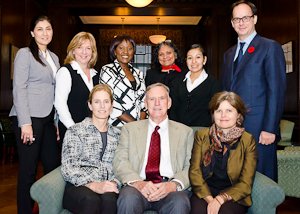
The arrival of these two new Fellows at McGill’s Faculty of Law was part of the impetus to create an ambitious, four-part seminar series on Disability, Human Rights and the Law, says the CHRLP’s Executive Director, Dr. Nandini Ramanujam, who spearheaded the initiative. Generously supported by the Hugessen, Rathlyn and Aisenstadt Foundations, this seminar series is co-presented by the CHRLP and the Disability and the L
aw Portfolio of the student-run Human Rights Working Group (HRWG). Through the seminars, the CHRLP aims to raise awareness of disability rights by discussing relevant laws and policies in an interdisciplinary and pluralistic fashion at the Faculty.
“This is a great initiative and has attracted a lot of attention from students, lawyers and members of the disability community,” says Ramanujan, who designed the series with help from undergraduate law student Nicholas Caivano, a Rathlyn Fellow at the Centre for Human Rights and Legal Pluralism, and Me Derek Jones, a bioethics analyst at the CHRLP’s Research Group on Health and the Law.
“We’re bringing together some of the top lawyers, professors, and human rights activists with students and members of the community to discuss key issues in disability law, including legal capacity, mental health in the workplace, and inclusive education,” says Caivano.
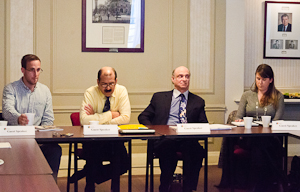
The first event, “From Rhetoric to Practice,” provided an initial look at efforts to implement the United Nations Convention on the Rights of Persons with Disabilities (CRDP), the world’s first international human rights treaty specific to disability, which came into force in 2008. Canada ratified this UN Convention in 2010, on the eve of the Paralympic Games in Vancouver, and is now working on the challenges of implementation.
One of the most contentious areas was explored at the most recent seminar, entitled “Equal Citizenship for Persons with Disabilities: Recognizing Legal Capacity,” held on November 7. It focused largely on Article 12 of the CRDP, which recognizes individuals with physical or mental disabilities as persons equal before the law, with equal legal capacity, who are entitled to governmental support in exercising that right. Modereted by Me Derek Jones, the panel included Me Michael N. Bergman (BCL’75, LLB’76), founder of the McGill Legal Information Clinic, Anna MacQuarrie, a Human Rights Officer at Inclusion International who participated in the negotiation of the CRDP, and Roger Bill, a law student who completed a human rights internship at Disability Rights International in Mexico City.
Further topics in the field of disability law will be examined at the next two seminars, on January 30 and February 18. For each event, a list of advance readings will be available online, and a critical summary subsequently posted on the CHRLP website, courtesy of Msipa and Rosas Aguilar who are serving as rapporteurs for the series during their time here.
More Exciting Initiatives in Disability Rights
“Another of our tasks is to work on a syllabus for a seminar course in disability and the law,” says Rosas Aguilar, “and possibly to implement a legal clinic specifically on disability issues.” Graduating student Mélanie Bénard, who coordinated the Disability and the Law Portfolio of the HRWG for the past three years, has also been working towards developing a Disability Studies Program at McGill. “There are a lot of disability-related courses already available in different faculties. An interdisciplinary major or minor would pull them all together,” she says.
Over the past few years, Bénard and her peers have put on a range of awareness-raising events, panel discussions and seminars on disability rights. Together, they have set the groundwork for the more intense focus on disability issues that we are seeing in the Faculty today. Indeed, “the Disability and the Law student portfolio has gathered a lot of momentum this year,” says Ramanujam.
“People just don’t know how bad things are for some individuals with disabilities,” says Bénard. “I have friends who haven’t been able to vote in recent elections and who can’t access public transportation, which makes it hard for them to get to work, or to get anywhere. Our society just isn’t structured to take people’s differences into account.”
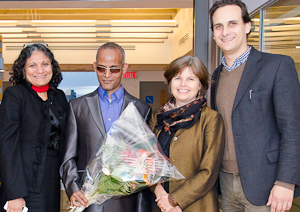
While she welcomes recent advances in disability rights on a global—if still largely theoretical—scale, Bénard remains committed to pragmatic, local action. “Quebec is lagging far behind other provinces and countries in terms of disability awareness and basic accessibility,” she says. “There’s a huge gap in this area of the law. That’s why I want to stay here when I graduate. I’m basically forging a whole new path. It’s daunting, but it’s also really inspiring.”
Bénard also draws inspiration from her fellow students at the Faculty of Law, including Portfolio co-coordinators Jeanne Mageau-Taylor and Anne-Claire Gayet, as well as graduate and doctoral students from around the world. In the summer of 2011, Benard and Eritrean DCL candidate Futsum Tesfatsion Abbay (LLM’02, DCL’12), who is visually impaired, were supported by the Rathlyn Fund to work for the CHRLP on a research project mapping legal education and research initiatives in the field of disability and human rights. One of the first O’Brien Fellows at the CHRLP, Abbay successfully defended his doctoral thesis on disability rights in Africa this past November.
What’s Next?
In 2013, lawyers, students and members of the community who wish to find out more about the rapidly evolving field of disability law shouldn’t miss the next two lunchtime seminars, each accredited for two hours of CLE by the Barreau du Québec.
On January 30, participants will explore international reforms for mental health in the workplace with a panel discussion entitled “Beyond Stigma and Exclusion” featuring our own Professor Sheppard and Me Jones, with Professor Anna Lawson, Senior Lecturer at the School of Law and Deputy Director of the Interdisciplinary Centre for Disability Studies at the University of Leeds, who will also be giving the Faculty’s fifth annual Lecture in Health and Law later that day.
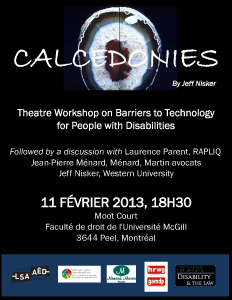
For the final installment of this year’s series, experts from McGill and the Mackay Centre School will tackle the subject of inclusive education on February 18, with a seminar entitled “Mainstreaming Disability.”
In addition, the HRWG will host a performance of Calcedonies at the Faculty on February 11. The play will be followed by a panel discussion with Laurence Parent from RAPLIQ (Regroupement des Activistes Pour l’Inclusion au Québec), Me Jean-Pierre Ménard, of Ménard, Martin avocats and the playwright Jeff Nisker, a Professor of Obstetrics and Gynaecology at Western University.
And from March 21 to 28, the Office for Students with Disabilities and McGill’s Joint Board Senate Sub-Committee on Persons with Disabilities will co-present Montreal’s first disability film festival.
Meanwhile, law students with an interest in the field of disability rights may also wish to check out three opportunities for further involvement: The CHRLP is offering two new human rights internships—one at ‘Legal Action for Persons with Disabilities’ in Uganda and one at ‘Disability Rights International’ in Mexico City.
In addition, the HRWG Portfolio’s Mageau-Taylor, who volunteers with Action Parrainage, tells us that the community organization is in need of mentors for adults with intellectual disabilities. And finally, the Disability and the Law Portfolio itself will need new recruits next year. To find out more, please contact disabilityandlaw@gmail.com.
– Text: Bridget Wayland
– Photos: Lysanne Larose
– Poster: courtesy of the HRWG
